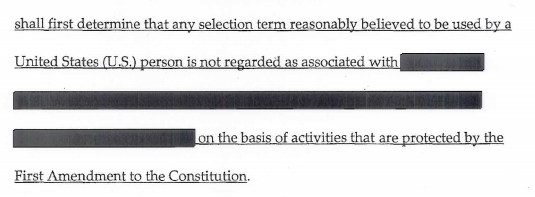I’m sure there will be voluminous analysis of Judge Vinson’s “Primary Collection Order” from the Foreign Intelligence Surveillance Court, which authorized the collection of metadata from Verizon, subject to many minimization procedures. In this post, I want to flag an important issue that may otherwise be ignored–the First Amendment.
The section in question is spread from pages 7-9 (including an entire page of redactions). It concerns how the government can conduct queries of the metadata.
For purposes of simplicity, I have typed out the relevant portions.
“provided, however, that NSA’s Office of General Counsel (OGC) shall first determine that any selection term reasonably believed to be used by a United States (U.S.) person is not regarded as associated with [REDACTED] on the basis of activities that are protected by the First Amendment to the Constitution.”
That is very significant. Granted, we do not have the full context of the order, but we can infer that Judge Vinson ordered NSA OGC to avoid conducting using search terms that would implicate activities protected by the First Amendment.
So what does this mean? A few possibilities. Most clearly, he is telling the NSA not to punish people for protected speech or association. But this is quite vague.
Another possible interpretation may relate to a potential overbreadth challenge. If NSA is using very broad search terms terms, a virtual dragnet, invariably they will suck in scores of metadata associated with communications central to the First Amendment–such as core political speech. Imagine if politicians or reporters were engaged in such communications. This could be viewed as a limitation with an eye towards not sweeping more broadly than necessary. Though, as we saw with the searches of AP phone records, this is probably not adhered to closely (don’t forget that AP is a corporation asserting free speech rights!).
Or, it could be making a freedom of association argument (akin to the arguments presented in Holder v. HLP), but there are no citations to any caselaw. This is doubtful. There is often a very fine line between expressing your views on a politics–views that may be very hostile to the current government–and supporting those deemed enemies of our government. I’ll leave it at that. I gather that, in theory, Vinson’s order would help to police against that. Though, this line is very vague, and unclear how the NSA treats it.
Vinson’s order could also tap into what Justice Sotomayor referred to in Jones as the chilling effect of surveillance: “[a]wareness that the Government may be watching chills associational and expressive freedoms.” (as pointed out by Howard Waserman).
Will Baude gave a shot at explaining how surveillance could violate the First Amendment, but was “skeptical.” Judge Vinson’s order may help shed light here. That’s not to say that any of these concerns are actually justiciable (until today, these arguments were not even known to the public). But, at least at some levels, the government is aware of how surveillance should be conducted with the First Amendment in mind.
In my new essay, “What Happens if Data is Speech,” I explore some of the First Amendment implications of affording data the protections of free speech. A related, and perhaps more relevant question for today, is what First Amendment claims may exist to challenge the broad collection of metadata.
Update: Vinson paraphrased the language from s. 215 of the Patriot Act (minus the word “solely”):
(2) An investigation conducted under this section shall—


